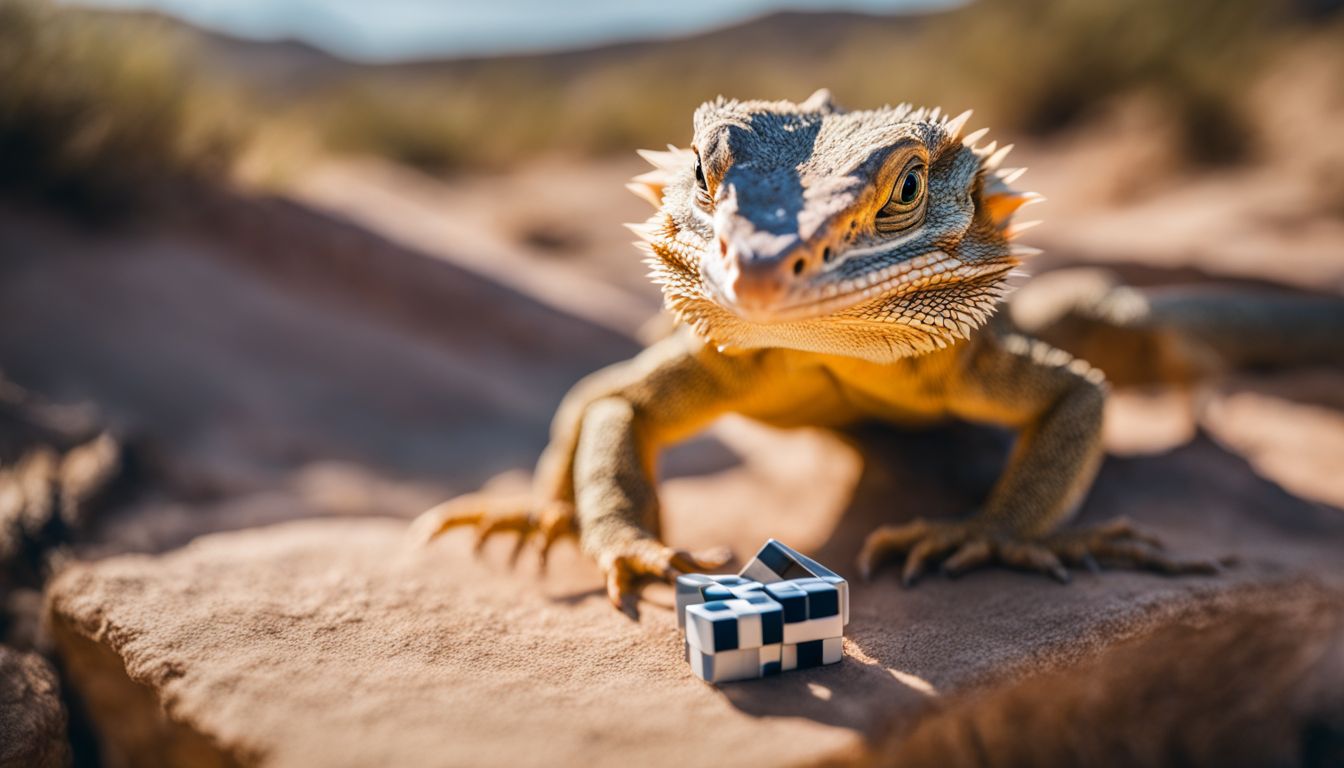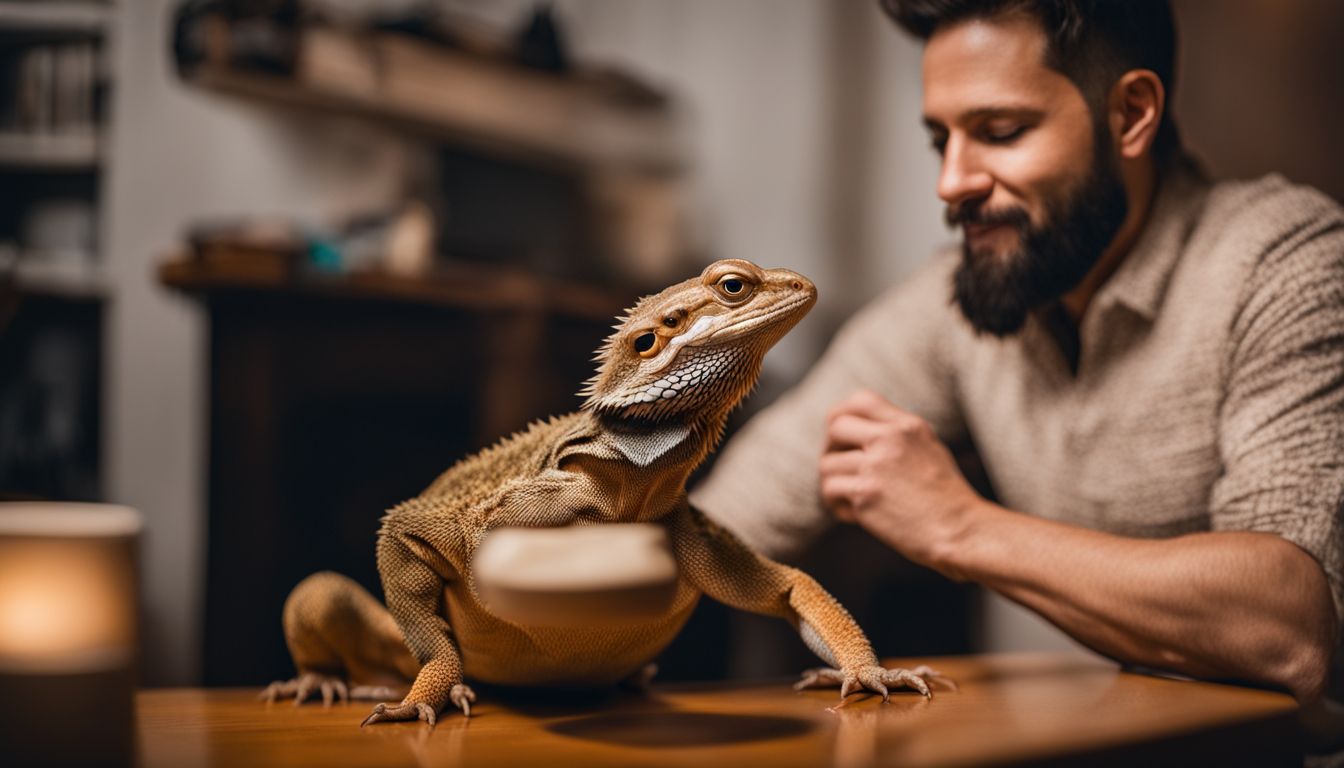Many people wonder if their bearded dragon pets are smart. Surprisingly, bearded dragons show a level of intelligence compared to other reptiles. This article will explore their cognitive abilities and how they interact with humans, providing insights into their mental capabilities.
Keep reading to find out more!
Understanding Bearded Dragons’ Intelligence

Bearded dragons exhibit impressive cognitive capabilities, displaying problem-solving skills and memory retention that contribute to their adaptability in different environments. Their learning aptitude allows them to recognize spatial patterns and grasp training cues, indicating a level of intelligence that intrigues researchers and reptile enthusiasts alike.
Cognitive Capabilities
Bearded dragons show off their smarts through impressive cognitive capabilities, including the ability to learn, remember, and make decisions. They’re not just your typical reptiles; they stand out for having a knack for picking up patterns and routines.
Imagine them watching another dragon solve a problem or navigate an obstacle—yes, they can actually learn by imitation! This kind of behavior is pretty sophisticated in the animal kingdom.
Now, take into account how their environment plays a role. Warmer temperatures might actually dial down their intelligence as they grow. It’s fascinating—temperature influences impacting brain development isn’t something you’d typically consider in reptiles.
Yet, here we are with bearded dragons showing us that even small changes in their nests could affect their learning and memory skills later on.
Learning Aptitude
Moving beyond their cognitive capabilities, bearded dragons also exhibit a notable learning aptitude. These reptiles can pick up on new skills by observing their peers—an ability known as social cognition.
This observational learning isn’t just limited to other bearded dragons. They’re capable of imitating the actions of different species too, showing a remarkable flexibility in behavior and training potential.
Their memory retention is impressive as well. Bearded dragons remember routines and patterns, which means they can adapt to and thrive in various environments when properly trained.
This capacity for learning also highlights their mental acuity; it’s clear these creatures have more going on upstairs than one might assume at first glance. With regular interaction and patience, they can learn complex behaviors, indicating a high level of intelligence among reptiles.
Comparing Bearded Dragons’ Intelligence to Other Species

Bearded dragons showcase a fascinating level of intelligence, especially when we place them on the spectrum with other reptiles. Let’s dive into a comparative analysis of how their smarts stack up against other species.
| Species | Intelligence Feature | Comparison to Bearded Dragons |
|---|---|---|
| Bearded Dragons | Can learn patterns and routines. | – |
| Turtles | Have memory capabilities. | Bearded dragons tend to show more adaptability in learning new routines than turtles. |
| Snakes | Exhibit problem-solving in hunting strategies. | While snakes use instinct for problem-solving, bearded dragons demonstrate a capacity for learning from experiences. |
| Chameleons | Display color change for communication. | Bearded dragons, in contrast, rely more on body language and have shown the ability to recognize their owners, suggesting a different kind of intelligence. |
| Iguanas | Capable of navigating mazes. | Although iguanas showcase problem-solving, bearded dragons’ interaction with humans suggests a higher level of social intelligence. |
Each reptile species has its unique set of intellectual abilities, but bearded dragons particularly shine in their interaction with humans and adaptability to routines. Their capability to learn and adjust sets them apart, offering a glimpse into the fascinating world of reptilian intelligence.
Bearded Dragons and Human Interaction
Bearded dragons can recognize familiar human faces and distinguish them from strangers.
They can also form attachments to their owners, showing affection and seeking attention.
Recognition of Owners
Bearded dragons recognize people through daily interactions and familiarity with their scent and voice. They remember routines and patterns, responding to different stimuli from their owners.
Many bearded dragons show signs of comfort and attachment around their owners, recognizing their voice and forming an emotional connection. This recognition demonstrates the bond created between these reptiles and humans, showcasing their cognitive abilities in understanding companionship.
Moving on to how bearded dragons compare in intelligence to other species..
Attachment to Humans
Like recognizing their owners, bearded dragons can also form attachments to humans. They show affection and recognize familiar faces. Bearded dragons are known to enjoy human interaction and engage with their owners when handled regularly.
Their display of attachment resembles that of traditional pets, making them excellent companions for those seeking a unique reptilian pet experience.
Bearded dragons exhibit an unusual capacity for showing affection towards their human caretakers, often forming strong bonds through regular interaction and handling. These affable reptiles have the ability to recognize individual humans and develop a sense of attachment based on positive experiences, demonstrating behaviors that are endearing and captivating for lizard enthusiasts seeking companionship from their exotic pets.
Bearded Dragons’ Diet and Cognitive Health
Bearded dragons have diverse dietary needs. As omnivores, they start by eating more live prey when young and slowly transition to a vegetarian diet as they age. It’s vital to provide them with a balanced mix of insects, leafy greens, and vegetables.
Their diet directly impacts their cognitive health as they age.
Additionally, bearded dragons possess remarkable cognitive abilities and can learn tricks or routines. This indicates that engaging them in activities and providing mental stimulation through their diet contributes to their overall cognitive well-being.
Regularly introducing new foods or varying the way meals are presented can keep their minds active and healthy as they grow older.
Conclusion
In conclusion, bearded dragons exhibit remarkable intelligence, showcasing cognitive abilities that set them apart from other reptiles. Their capacity for learning, social interaction, and problem-solving demonstrates their mental acuity.
Through observation and adaptation to their surroundings, they display a level of cleverness that continues to fascinate researchers and enthusiasts alike. As pets, their ability to recognize and bond with humans adds another dimension to their intelligence, making them captivating companions for those who appreciate their unique capabilities.
Overall, the evidence strongly supports the assertion that bearded dragons are indeed smart creatures with complex cognitive skills.
FAQs
1. Are bearded dragons intelligent?
Yes, bearded dragons are considered intelligent reptiles and can display problem-solving abilities.
2. Can bearded dragons recognize their owners?
While not the same as mammals, some bearded dragons may show recognition of familiar humans through repeated interactions.
3. Do bearded dragons require mental stimulation?
Providing environmental enrichment such as varied habitats and interactive activities can help keep them mentally engaged.
4. How do I train a bearded dragon to do tricks?
Using positive reinforcement techniques like treats and repetition can help in teaching simple behaviors or actions to a pet bearded dragon.
5. What are signs that my bearded dragon is displaying intelligence?
Behaviors such as problem-solving, learning from experiences, and adapting to changes in their environment can indicate intelligence in these reptiles.



